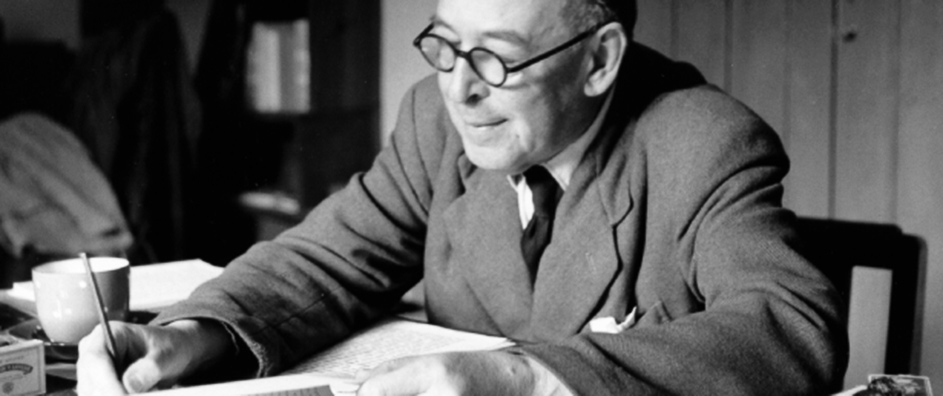The views expressed in our content reflect individual perspectives and do not represent the authoritative views of the Baha'i Faith.
C.S. Lewis’ writing, from Narnia through Mere Christianity, provided a crucial link in my spiritual growth, and I still treasure my foot-long shelf of his books.
I do not know if he ever even heard of the young Baha’i Faith during his own life, and if he had, what regard he would have given it. So complete was his attachment to Christianity that I would presume if his exposure to the Baha’i Faith was superficial he would have dismissed it as he did all others in the theological forest. However, I like to imagine that if he had encountered an unattributed collection of any number of Abdu’l-Baha’s rational expositions, with their air-tight logic on the existence of God, the nature of Jesus Christ, or commentaries on Old or New Testament scripture itself–in other words, if Lewis had taken a blind taste test–he unwittingly would have become a fan if not a follower. Ultimately, of course, I have no idea.
But in Chapter 17, the final portion of The Lion, The Witch, and the Wardrobe, Lewis crystallizes the Baha’i teachings regarding the Manifestations of God perfectly in a few choice lines. The four Pevensie children have been crowned kings and queens of Narnia:
But amidst all these rejoicings Aslan himself quietly slipped away. And when the Kings and Queens noticed that he wasn’t there they said nothing about it. For Mr. Beaver had warned them, “He’ll be coming and going’ he had said. “One day you’ll see him and another you won’t. He doesn’t like being tied down — and of course he has other countries to attend to. It’s quite all right. He’ll often drop in. Only you mustn’t press him. He’s wild, you know. Not like a tame lion.”
Here, the Manifestation of God comes and goes in different eras, and “attends to other countries,” a Baha’i tenet if ever there were one:
…it is evident that God has destined and intended religion to be the cause and means of cooperative effort and accomplishment among mankind. To this end He has sent the Prophets of God, the holy Manifestations of the Word, in order that the fundamental reality and religion of God may prove to be the bond of human unity, for the divine religions revealed by these holy Messengers have one and the same foundation. – Abdu’l-Baha, The Promulgation of Universal Peace, p. 338.
In book Five of the Narnia tale, The Silver Chair, our new protagonist Jill, another British school girl drawn into Narnia, stands by a stream when she sees Aslan for the first time.
“I’m dying of thirst,” said Jill.
“Then drink,” said the Lion.
“May I–could I–would you mind going away while I do?” said Jill.
The Lion answered this only by a look and a very low growl. And as Jill gazed at its motionless bulk, she realized that she might as well have asked the whole mountain to move aside for her convenience.
The delicious rippling noise of the stream was driving her nearly frantic.
“Will you promise not to–do anything to me, if I do come?” said Jill.
“I make no promise,” said the Lion.
Jill was so thirsty now that, without noticing it, she had come a step nearer.
“Do you eat girls?” she said.
“I have swallowed up girls and boys, women and men, kings and emperors, cities and realms,” said the Lion. It didn’t say this as if it were boasting, nor as if it were sorry, nor as if it were angry. It just said it.
“I daren’t come and drink,” said Jill.
“Then you will die of thirst,” said the Lion.
“Oh dear!” said Jill, coming another step nearer. “I suppose I must go look for another stream then.”
“There is no other stream,” said the Lion.
It never occurred to Jill to disbelieve the Lion–no one who had ever seen his stern face could do that–and her mind suddenly made itself up. It was the worst thing she had ever had to do, but she went forward to the stream, knelt down, and began scooping up water in her hand. It was the coldest, most refreshing water she had ever tasted. You didn’t need to drink much of it, for it quenched your thirst at once.
“Come here,” said the Lion. And she had to. She was almost between its front paws now, looking straight into his face. But she couldn’t stand that for long; she dropped her eyes.
This episode is clearly autobiographical. In his actual autobiography, Surprised by Joy, Lewis described his final, futile struggle against belief in God:
You must picture me alone in that room in Magdalen, night after night, feeling, whenever my mind lifted even for a second from my work, the steady, unrelenting approach of Him whom I so earnestly desired not to meet. That which I greatly feared had at last come upon me. In the Trinity Term of 1929 I gave in, and admitted that God was God, and knelt and prayed: perhaps, that night, the most dejected and reluctant convert in all England.
















Comments
Sign in or create an account
Continue with Googleor